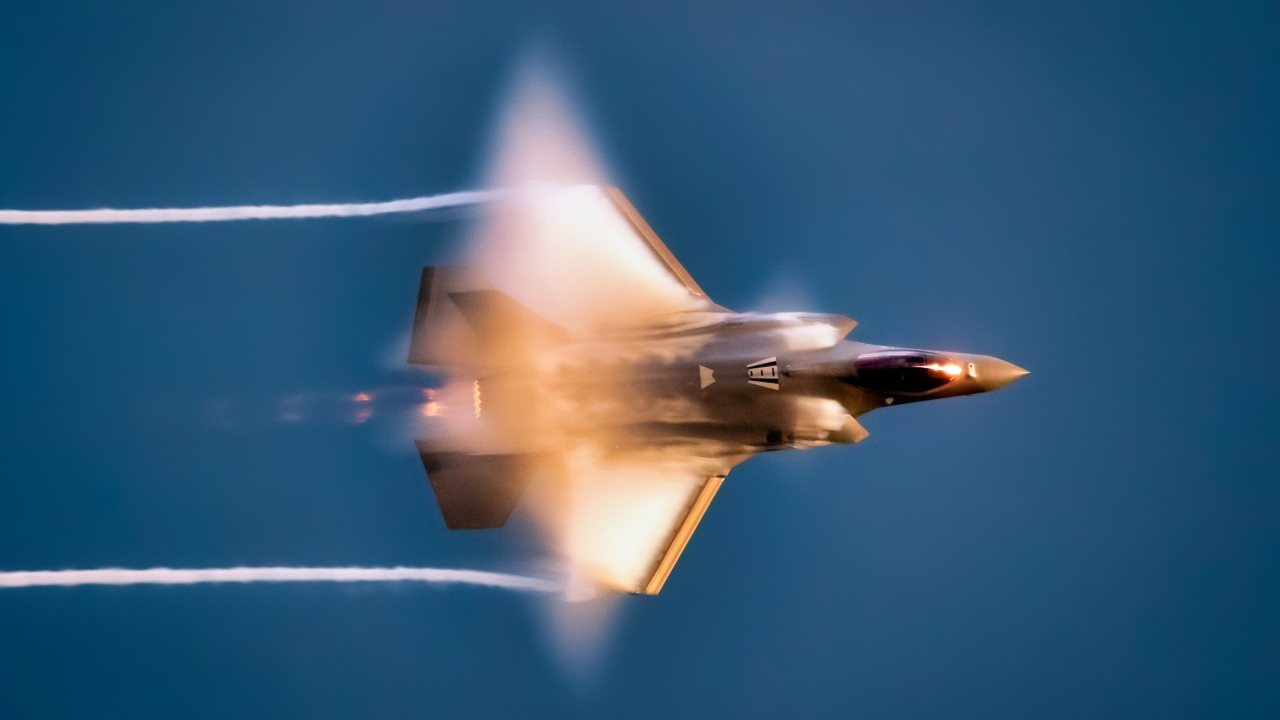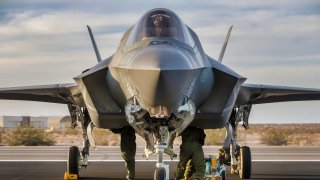Time to Sell the F-35 Fighter to Taiwan?
Handing over the F-35, America’s primary air superiority and strike fighter, to a force that is destined to lose to America’s number geostrategic and geotechnological foe is not a smart move.
Taiwan is the threatened democracy, as my late colleague Bruce Herschensohn once wrote. The island sits just across from the 110-mile-wide Taiwan Strait. On the other side of that strait is that massive, hulking, revanchist Chinese Communist Party-controlled People’s Republic of China. A foundational tenet of the CCP’s rule is to bring Taiwan under the mainland’s control. Beijing’s rulers say they’d prefer to achieve this peacefully. But they are willing to use force to accomplish their goal.
To counter China’s threat to Taiwan, the United States and its allies have sold an incredible amount of weapons to the threatened island democracy going back to the 1970s, when Congress forced a recalcitrantPresident Jimmy Carter to sign the Taiwan Relations Act (to balance against the Carter Administration’s policyof recognizing China rather than Taiwan as a legitimate nation-state and trading partner). Missile systems, warplanes, tanks, ammunition, and other important forms of military aid were all conferred upon Taiwan. Despite this, many are rightly questioning Taiwan’s military readiness.
The Taiwanese Must Be Willing to Defend Taiwan
Recently, former Trump Administration national security adviser, Robert C. O’Brien, sojourned to Taiwan and urged the island nation’s 23 million citizens to arm themselves, citing that having so many personal firearms would further deter China from invading the island (and if they did invade, they’d be pushed back by a well-armed populace). That suggestion was met with consternation from the Taiwanese press and many prominent politicians—even some leaders of the pro-independence Democratic Progressive Party (DPP) took umbrage with O’Brien’s quite logical suggestion to the Taiwanese people.
Taiwan’s military is well-provided-for from a technological standpoint. But the problem is with the Taiwanese people. A small fraction is willing to stand and fight for their country whereas most Taiwanese, while they may not seek to return to the hard bosom of China, are also unwilling to leave their comfortable lives to fight. And the current Taiwanese military is far too conventional of a force—and much smaller than China’s military—to be anything more than a speed bump in China’s push for invasion. Like so many American allies over the decades, the small nation of Taiwan seeks to become a tiny mirror image of America’s military.
But this is a mistake.
Under present conditions, if the United States military and the forces of its regional partners are unable to assist in the defense of Taiwan during a Chinese invasion, the Taiwanese conventional military forces will not be able to hold out indefinitely. These conventional Taiwanese forces will be degraded and, through attrition, ultimately defeated in war with the larger Chinese invasion force.
The most that Taiwan’s conventional forces can hope to do—notably Taiwan’s navy and air force—is to hold China’s invasion back long enough to move top Taiwanese leaders to safety and to allow for civil defense unitsto break up into small cadres, hide among the Taiwanese population, and prepare to wage the mother-of-all insurgencies.
Where Taiwan Should Direct Its Resources
In the past, I have written of the need to supply Taiwan’s air force with America’s new F-15EX Eagle II warplanes (which are essentially missile trucks). These systems, if they were kept close to Taiwan’s shores could prove instrumental in the inevitable air war that will be waged in the skies above Taiwan. Yes, these planes are newer and more advanced than other fourth-generation warplanes in America’s arsenal.
Although, they are not so advanced that, if captured by Chinese forces, major US military industrial secrets would be essentially handed over to China.
That is why Washington must never cave to calls for the F-35 Lightning II to be given over to Taiwan. These planes might help to better defend Taiwan. But there will never be enough of them on hand to truly shift the inevitable war over Taiwan in Taiwan’s favor. And losing these systems would be a costly affair—especially because they are not indigenously produced (and any indigenous production facilities would be targeted for destruction by China’s air force at the onset of any war over Taiwan).
If Taiwan really desires an F-35-like warplane, they should look closer to home. South Korea is nearing completion of the development of its fourth-generation-plus KF-21 Boramae (which was developed jointly with Indonesia’s air force as well as with inputs from Lockheed Martin, the makers of both the F-22A Raptor and the F-35 Lightning II). While not a full-blown fifth-generation warplane, the South Korean KF-21 would be another worthwhile addition to Taiwan’s beleaguered air force.
But handing over the F-35, America’s primary air superiority and strike fighter, to a force that is destined to lose to America’s number geostrategic and geotechnological foe is not a smart move.
Taiwan Should Be More Like the Mujahideen and Less Like South Vietnam
Where Taiwan should be directing its limited defense budget is in the creation of better coastal defense batteries, hypersonic weapons, submarines (preferably small subs that can maneuver well in the tight quarters of the Taiwan Strait and be easily repaired and mass produced), island-wide electromagnetic (EM) spectrum jammers to degrade China’s ability to operate in the electronic battlespace, and small arms—lots and lots of small arms—to equip insurgent civil-defense forces with, once China’s military takes the island.

The island-nation should invest in building a massive fleet unmanned aerial vehicles (UAV), which have been used with such devastating effects by Ukraine in their war against Russia.
But none of my suggestions should be taken to mean that Taiwan can—or should—try to fight a conventional war with China, even a defensive one. It should marshal its resources and deploy it at the backend of a conflict, to bleed the Chinese occupiers dry over the long-run, just as the Mujahideen had done to the Soviets in their ten-year war against the USSR in Afghanistan.
About the Author
Brandon J. Weichert, a National Interest national security analyst, is a former Congressional staffer and geopolitical analyst who is a contributor at The Washington Times, as well as at American Greatness and the Asia Times. He is the author of Winning Space: How America Remains a Superpower (Republic Book Publishers), Biohacked: China’s Race to Control Life, and The Shadow War: Iran’s Quest for Supremacy. Weichert can be followed via Twitter @WeTheBrandon.


